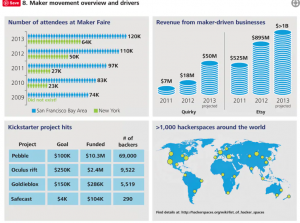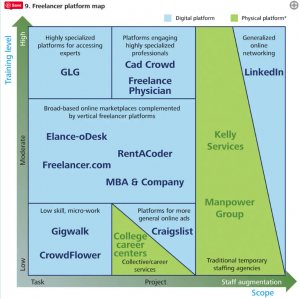Fragmentation
Jump to navigation
Jump to search
A concept akin to OSE's Distributed Market Substitution, stating that a large number of economic free agents will sprout around monopolistic internet platforms, and become an increasing influence in the economy.
https://www2.deloitte.com/us/en/insights/topics/operations/heros-journey-landscape-future.html
Pathways to fragmentation For individuals and small entities, the barriers to forming and pursuing a business venture are rapidly being dismantled. As barriers fall, many small yet viable players will emerge, with increasing influence on the economy, via three primary pathways:
- Freelancers, empowered by online staffing platforms, will begin as individual contractors, but will quickly transition to forming flexible teams—colloquially called “hives”—comprised of other freelancers with complementary skill sets. Gradually, these hives will move from just accepting work from other businesses to collectively creating their own products and services, and ultimately forming their own small companies.
- Hobbyists will transition from “moonlighting”—working full-time for someone else while pursuing their passion projects during off-hours—to being fully dedicated business owners. Consider that, while only 18 percent of Etsy’s sellers sold their products full-time in 2012, 91 percent aspired to grow their businesses. Of those who wanted to grow, 61 percent aspired to grow to a “manageable size” rather than to achieve unlimited growth.60 These aspirations signal the possibility of a broad shift in the common notion of a successful business.
- “Star” performers within big companies—confident of their value and frustrated by a lack of autonomy—will increasingly choose to leave employers in favor of building businesses that use their full range of talents. Enabled by new tools and technologies, these workers may be able to experience the same, or greater, success as in their corporate jobs while deriving additional benefits from greater autonomy and doing work that better aligns with their personal values.

